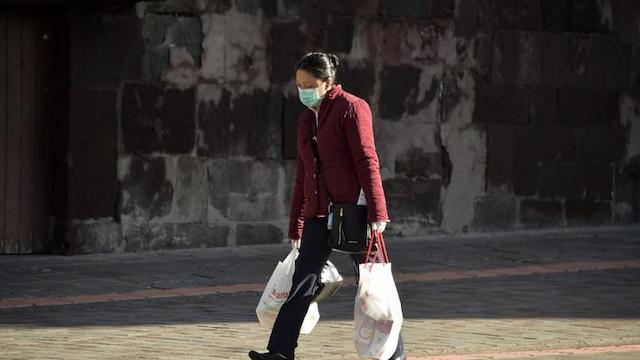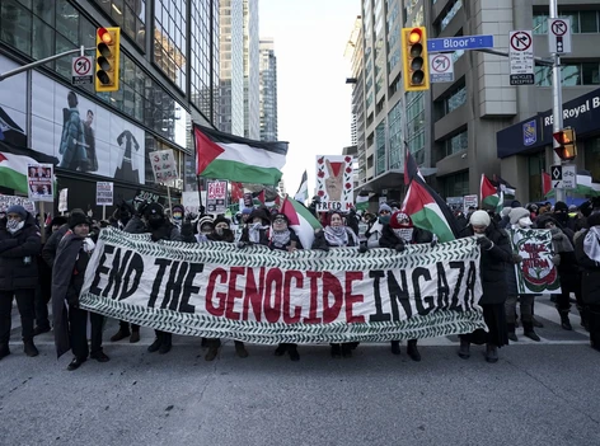
A woman wears a face mask as she walks outside Carondelet government palace in Quito on April 22, 2020 - Copyright RODRIGO BUENDIA/AFP
Financial crisis cuts have put Greece in unique position to combat coronavirus
Itís been ten years since Greece took the first steps to emerge from its financial crisis.
Austerity meant severe cuts to an already battered healthcare system.
But it also forced the Greek state to re-think how it confronts major crises.
As Symela Touchtidou reports, itís finally paying off -- with Greece finding itself in a unique position to combat the coronavirus.
Watch more by clicking on the player above.
Turkey marks its 100th year of parliament amid coronavirus
A Turkish Airlines plane flew over the country drawing the Turkish flag in its flight path to mark centennial celebrations for the founding of the nationís parliament on Thursday.
The celebrations for Turkeyís National Sovereignty and Childrenís Day were changed due to the coronavirus pandemic, with authorities replacing parades and school ceremonies with observances in line with social distancing efforts.
Flight tracking website Flightradar24 showed a crescent and a star over Turkey outlined by a Boeing 777. Turkish television stations showed children with flags on their neighborhood streets.
The government has also asked Turkish citizens to sing the national anthem in the evening.
Officials wearing masks visited the mausoleum of Turkeyís founder.
The latest health ministry figures show 1,814 people have died from the coronavirus in Turkey, which ranks seventh in the world in the number of confirmed infections, which are nearing 100,000, according to Johns Hopkins University.
Spainís daily death toll marks slight increase
Spain reported on Thursday that 440 people have died of coronavirus in the country in one day.
This marks a slight increase from Wednesdayís figure of 435 deaths.
The countryís number of confirmed coronavirus cases have risen, too, with 4,635 new cases (compared to Wednesdayís 4,200).
The daily number of patients who have healed from the disease was 3,335 on Thursday, lower than Wednesdayís 3,401
Eurozone economy shrinking by quarterly rate of 7.5% - survey
A closely watched survey of economic activity across the 19-country Eurozone suggests that the single currency bloc is shrinking at a quarterly rate of 7.5% as a result of the lockdowns meant to get a grip on the coronavirus pandemic.
Financial information firm IHS Markit said Thursday that its purchasing managersí index for the eurozone - a broad gauge of economic activity - plummeted to an all-time low of 13.5 points in April from the previous record low of 29.7 in March.
The firm has been compiling data for more than 20 years. Anything below 50 indicates a contraction in activity, with a lower number indicating a sharper drop.
The scale of the April decline suggests that the Eurozone is heading for an unprecedented slump: At its lowest during the global financial crisis in 2009, the index only fell to 36.2.
"With large swathes of the economy likely to remain locked down to contain the spread of COVID-19 in coming weeks, the second quarter looks set to record the fiercest downturn the region has seen in recent history," said Chris Williamson, chief business economist at IHS Markit.
Williamson said that at the current rate, the Eurozone is shrinking by a quarterly rate of 7.5%.
European Union leaders will hold a virtual summit on Thursday at which they are expected to endorse a financial aid package worth €540 billion that would help pay lost wages, keep companies afloat and fund health care systems.
The EUís institutions and nations have already mobilized around €3.3 trillion to help over-burdened health services, suffering small businesses, embattled airlines and the newly jobless.
Nurse from New Zealand recounts treating Boris Johnson for coronavirus in Londonís St Thomasí Hospital
Nurse Jenny McGee from New Zealand says that helping save somebody as notable as Boris Johnson in his battle with the coronavirus didnít faze her thanks to her years of dealing with stressful situations in intensive care wards.
Jenny McGee was one of two National Health Service nurses who were singled out for praise by the British prime minister after he was discharged from St. Thomasí Hospital in London earlier this month.
Johnson, 55, was the first world leader confirmed to have the virus.
In an interview with Television New Zealand that aired on Thursday, McGee said the staff treated Johnson as just another patient. She has worked for 10 years in intensive care, including five as a leader.
"When I got in the car after work each night and I could hear things about Boris Johnson on the news. That was very surreal because I thought íWow. Iíve been looking after him,í" she said.
She said she was taken by surprise when he mentioned her by name in his address.
Her role at the hospital is constantly monitoring her patients and giving feedback to the doctor.
McGee said that the work during the pandemic has been physically exhausting and emotionally straining as she and her colleagues do their best to save as many lives as they can.
"The darkest moment most definitely is being with someone who has passed away and their family is not there," she said.
China pledges an additional $30 million for WHO
Chinese authorities said on Thursday they will give an additional $30 million to the World Health Organization (WHO), in an announcement made a few days after the US withdrew its funding for WHO.
"The money will help with prevention and control of the COVID-19 pandemic, and to support the development of health care services in some countries," Geng Shuang, the spokesperson for Chinaís Foreign Affairs ministry, said.
Last week, the United States said it was suspending its WHO funding, citing as a reason the WHOís well-inclined position towards China and US president Trump criticised the WHOís "bad management" of the pandemic.
"To support WHO at this critical moment of the global fight against the pandemic is to defend ideals and principles of multilateralism and to fight for the authority of the United Nations", Geng Shuang said during Chinaís daily press briefing.
Shuang added that China has already given $20 million to the WHO.
French Interior minister cites "strictness of the lockdown" and "poverty" as causes of unrest in Paris suburbs
French Interior minister Christophe Castaner said on Thursday that the tensions in some Paris suburbs that erupted at the weekend were due to "the strictness of the lockdown" in the country.
On BFM TV channel, Castaner said that the violences had "several causes".
"There is the strictness of the lockdown, its effects on the youth - because most of them are young," Castaner said. "These are small groups who think that it can be fun to attack the police or burn down trash cans. Itís not fun, itís dangerous, for a start they put themselves in danger."
Another cause cited by the minister was "the poverty in which they live with their family, and which can provoke anger."
But, Castaner added, "the answer is not to burn down the neighbourís car".
He said the police "systematically" intervenes but that its role is also to help the youth in these suburbs.
Tokyo Olympics wonít be postponed again, Olympic Committee chief says
The Tokyo Olympic Games, postponed from summer 2020 to 2021 due to the global pandemic of coronavirus, cannot be postponed again, the president of the Olympic Committee Yoshiro Mori said on Thursday.
There is "no chance" that the Games are postponed beyond 2021, Mori said in an interview with the Japanese news wire Kyodo News.
"With the athletes and the organisation issues in mind, it is technically impossible to postpone the event by two years," Mori said.
A two-year delay was initially considered by the Committee, Mori added, and Japanís PM Shinzo Abe was consulted on the issue. Abe "said that the way to go was a one-year postponement", Mori explained.
The Tokyo Olympics are planned to start on 23 July 2021.
Earlier this week, a Japanese expert criticised the countryís pandemic management measures and said that he was "pessimistic" regarding Japanís ability to host the Games in 2021.
"Honestly, I donít think that itís probable that the Olympic Games be held next year," Kentaro Iwata, a bacteriology professor at the Kobe (west) University said in a press conference via video.
For the Olympics to happen in 2021, the fight against coronavirus pandemic should be won not only Japan but the rest of the world, too.
France will not financially support companies registered in tax havens
Franceís measures to ease the economic impact of the coronavirus crisis will not include financial aid to companies that are registered in tax havens, the French Economy Minister Bruno Le Maire said on Thursday.
EU prepares for key videoconference summit as leaders are divided on common coronavirus response
EU leaders will try to agree on a cohesive financial response to the COVID-19 crisis during a key summit by video conference on Thursday.
They will discuss the €500 billion package that has already been agreed to in principle, as well as the potential of more bailout funds.
Spain, Italy and France have warned that without more unity, the coronavirus pandemic could be the beginning of the end of the EU.
Euronewsí Political editor Darren McCaffrey talks to MEPs to learn more: watch the video by clicking on the player above.
Two New York cats test positive for coronavirus
Two cats have been ill with coronavirus in New York, the Centers for Disease Control and Prevention (CDC) said on Wednesday.
They are the first pets to be officially declared positive to the virus in the US, the CDC added.
The cats suffered from respiratory issues, but were treated by veterinarians who have said they will fully recover, the CDC said.
No human in the first catís household has shown COVID-19 symptoms, but due to a lack of tests, it has not been possible to determine if they carried the virus.
The owner of the second cat has been tested positive with the coronavirus.
The cats live in separate areas of New York state, Americaís COVID-19 epicenter.
Coronavirus pandemic fast becoming a íhuman rights crisisí, UN chief warns
UN Secretary-General Antonio Guterres said Thursday that the coronavirus pandemic is "a human crisis that is fast becoming a human rights crisis."
The UN chief said in a video message that there is discrimination in the delivery of public services to tackle COVID-19 and there are "structural inequalities that impede access to them."
Guterres said the pandemic has also seen "disproportionate effects on certain communities, the rise of hate speech, the targeting of vulnerable groups, and the risks of heavy-handed security responses undermining the health response."
He warned that with "rising ethno-nationalism, populism, authoritarianism and a push back against human rights in some countries, the crisis can provide a pretext to adopt repressive measures for purposes unrelated to the pandemic."
In February, Guterres issued a call to action to countries, businesses and people to help renew and revive human rights across the globe, laying out a seven-point plan amid concerns about climate change, conflict and repression.
"As I said then, human rights cannot be an afterthought in times of crisis - and we now face the biggest international crisis in generations," he said.
The secretary-general said he was releasing a report Thursday on how human rights must guide the response to the virus and recovery from the pandemic. Neither he nor the report name any countries or parties responsible for human rights violations.
Guterres said governments must be "transparent, responsive and accountable," and stressed that press freedom, civil society organizations, the private sector and "civic space" are essential.
The report said governments also need to take action to mitigate the worst impacts of COVID-19 on jobs, livelihoods, access to basic services and family life. Guterres said any emergency measures - including states of emergency - must be "legal, proportionate, necessary and non-discriminatory, have a specific focus and duration, and take the least intrusive approach possible to protect public health."
"Emergency powers may be needed but broad executive powers, swiftly granted with minimal oversight, carry risks," the report warned. "Heavy-handed security responses undermine the health response and can exacerbate existing threats to peace and security or create new ones."
The report said the best response is proportionate to the immediate threat and protects human rights. "The message is clear: People - and their rights - must be front and center," Guterres said.
French Senate approves altered 2020 budget to adapt to coronavirus crisis
The French Senate approved on Wednesday night the governmentís altered 2020 budget proposal to face the economic impact of the coronavirus pandemic, worth €110 billion.
This "crisis budget" is based on an estimation of a 8% GDP decrease compared to 2019. Public spending will considerably increase from last year to compensate the losses due to the pandemic.
The budget proposal anticipates a sum of €24 billion for furlough loans and €20 billion to recapitalise strategic companies that have suffered from the crisis, such as Air France.
Seven billion euros will be put aside to help small businesses and freelancers and the countryís poorest households will receive €150 in monthly aid, plus €100 per child.
SOURCE: Euoronews
LINK: https://www.ansarpress.com/english/16244
TAGS:






























 Farkhunda Buried, Ghani Appoints Fact-Finding Team
Farkhunda Buried, Ghani Appoints Fact-Finding Team




